Why Finding Safe Gluten-Free Drinks Matters for Your Health
Gluten free alcoholic beverages are essential for millions of people managing celiac disease or gluten sensitivity. When gluten proteins from wheat, barley, or rye enter your system, they can trigger serious digestive issues, nutrient malabsorption, and long-term intestinal damage.
Quick Answer: Safe Gluten-Free Alcoholic Options
- Wine - Made from grapes (naturally gluten-free)
- Hard Cider - Made from apples (naturally gluten-free)
- Distilled Spirits - Vodka, gin, rum, tequila, whiskey (gluten removed through distillation)
- Certified Gluten-Free Beer - Made from sorghum, rice, or millet
- Hard Seltzers - Made from fermented cane sugar
Avoid These:
- Regular beer, ale, lager, stout
- "Gluten-removed" beer (not safe for celiacs)
- Malt-based coolers or beverages
The confusion around alcohol and gluten often stems from the different ways alcoholic beverages are made. Fermented drinks like beer keep gluten proteins intact, while distilled spirits remove them entirely through the distillation process.
As Sylwester Skóra, founder of Two Flags Vodka with deep roots in Polish distilling traditions, I've spent years perfecting gluten free alcoholic beverages that meet the highest purity standards. My experience crafting premium spirits has taught me the critical importance of understanding which drinks are truly safe for those avoiding gluten.
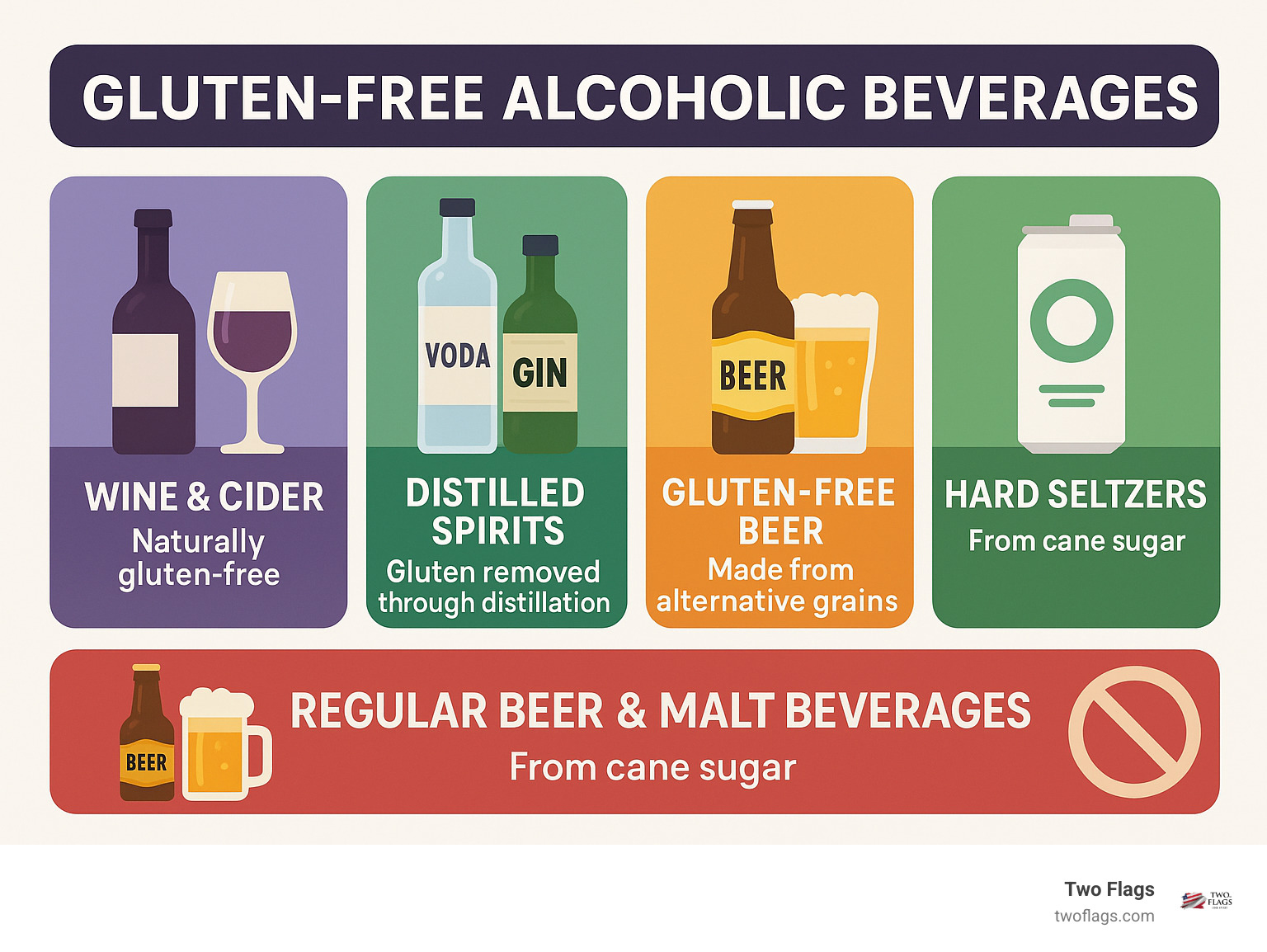
Understanding Gluten in Alcohol: Fermented vs. Distilled
Here's something that might surprise you: not all alcoholic drinks handle gluten the same way. The secret lies in how they're made. When you're searching for gluten free alcoholic beverages, understanding the difference between fermentation and distillation can be a real game-changer for your safety and peace of mind.
Let's start with the basics. Gluten is a group of proteins naturally found in wheat, barley, and rye. These are the same proteins that make bread dough stretchy and give it that satisfying chew. But for anyone with celiac disease or gluten sensitivity, these proteins can wreak havoc on your digestive system and overall health.
The key to understanding which drinks are safe comes down to two very different processes: fermentation and distillation. Think of them as two completely different paths that ingredients can take on their journey to becoming alcohol.
The Fermentation Factor
Fermentation is nature's way of turning sugar into alcohol. Yeast (or sometimes bacteria) gets to work on sugars, changing them into alcohol, carbon dioxide, and other compounds. It's how we get beer, wine, and many other beloved drinks.
Here's the catch: if you start with gluten-containing ingredients, you'll likely end up with gluten in your final product. The fermentation process doesn't remove or break down gluten proteins – it simply carries them along for the ride.
Take traditional beer, for example. Most beers start with malted barley, and sometimes wheat. Both of these grains are loaded with gluten. During the brewing process, those gluten proteins from the barley or wheat stay put in the finished beer. This is exactly why your typical beer, ale, or lager isn't safe for anyone avoiding gluten.
But here's where it gets interesting. Wine and hard cider are also fermented beverages, yet they're naturally gluten free alcoholic beverages. The difference? They start with grapes and apples respectively – fruits that don't contain any gluten to begin with. When you ferment grape juice, you get wine. When you ferment apple juice, you get cider. No gluten goes in, so no gluten comes out.
The Distillation Difference
Now we get to the fascinating world of distillation – the process that transforms many spirits into safe gluten free alcoholic beverages, even when they started with gluten-containing grains.
Distillation is essentially a purification process. The fermented liquid gets heated until the alcohol turns into vapor. That vapor rises up, gets collected, and then condenses back into liquid form. It's like nature's own filtration system, separating alcohol from everything else.
Here's where the science gets really interesting: gluten proteins are heavy and have very high boiling points. When that fermented liquid heats up, the alcohol happily turns into vapor and floats away, but those bulky gluten proteins get left behind in the still. They're simply too heavy to make the journey.
This is why a vodka made from wheat can still be completely gluten-free after distillation. The distillation process is incredibly effective at removing these proteins, leaving behind pure, clean alcohol with no detectable gluten. Scientific research on the distillation process confirms this compatibility with gluten-free diets.
This scientific understanding gives us confidence in crafting spirits that are truly safe. The distillation process ensures that the final product is pure and gluten-free, regardless of the starting grain. It's this same process that makes vodka, gin, rum, tequila, whiskey, and brandy safe options for those avoiding gluten.
The one thing to watch out for? Post-distillation additives. Some flavored spirits or liqueurs might have gluten-containing ingredients added after the distillation process is complete. But pure, distilled spirits? They're your friends on a gluten-free journey.
Naturally Gluten-Free Sips: Wine, Cider, and More
When you're looking for gluten free alcoholic beverages, some of the most delightful options come straight from nature itself. These drinks start with ingredients that never contained gluten in the first place, making them naturally safe and delicious choices for your gluten-free lifestyle.

Think about it this way: grapes don't have gluten, and neither do apples. So when these fruits are fermented into wine and hard cider, the resulting beverages remain naturally gluten-free. It's that simple! This makes wine and cider some of the most reliable gluten free alcoholic beverages you can enjoy without worry.
Is All Wine and Cider Safe?
The good news is that yes, almost all wines and hard ciders are naturally gluten-free! Wine comes from fermented grapes, and since grapes grow gluten-free, your glass of Pinot Grigio or Cabernet stays that way too. The same goes for hard cider made from apples.
Even your favorite sparkling wines like Champagne and Prosecco are naturally gluten-free. So go ahead and celebrate with those bubbles - they're perfectly safe for your gluten-free diet.
But let's talk about those rare exceptions, because being informed keeps you safe. Occasionally, winemakers use fining agents to clarify their wine and make it crystal clear. In the past, some producers might have used wheat-based proteins for this process, but modern winemaking typically relies on gluten-free alternatives like egg whites or bentonite clay.
There's also an old-school practice of using wheat paste to seal aging barrels. This sounds scary, but it's incredibly rare today, and testing shows that even when it was used, it didn't add detectable gluten to the wine.
For ciders, the main thing to watch for is added malt or barley. True hard cider is made from apples, but some producers create "malt ciders" that are basically malt beverages with apple flavoring. Always check that label - if it says "hard cider" and lists apples as the main ingredient, you're golden.
Exploring Other Gluten-Free Alcoholic Beverages
The world of naturally gluten free alcoholic beverages extends far beyond wine and cider, offering some truly unique experiences.
Mead, often called honey wine, is one of humanity's oldest alcoholic beverages. Made by fermenting honey with water, it's naturally gluten-free and offers flavors ranging from sweet and floral to dry and complex. Some modern meads include fruits or spices, creating endless variety while staying gluten-free.
Sake presents an interesting case. This traditional Japanese rice wine is made from fermented rice, which is naturally gluten-free. You might wonder about the koji mold used in production, which is sometimes grown on barley, but the brewing and filtration process removes any gluten proteins. Stick with pure, 100% rice sake and avoid flavored varieties that might contain questionable additives.
Hard kombucha has become the trendy newcomer to the gluten-free scene. Made from fermented tea, sugar, and a SCOBY (that's the symbiotic culture of bacteria and yeast that makes the magic happen), most hard kombuchas are naturally gluten-free. They offer a refreshing, slightly tangy alternative with the added benefit of probiotics.
These naturally gluten-free options prove that following a gluten-free diet doesn't mean sacrificing variety or flavor. From ancient mead to modern hard kombucha, there's a whole world of safe, delicious drinks waiting to be explored.
The World of Gluten-Free Spirits: The Magic of Distillation
When it comes to gluten free alcoholic beverages, distilled spirits often create the biggest confusion. It's completely understandable why someone might think that vodka made from wheat or whiskey made from barley would contain gluten. After all, these grains are packed with gluten proteins. But here's where the science gets really interesting – and reassuring.
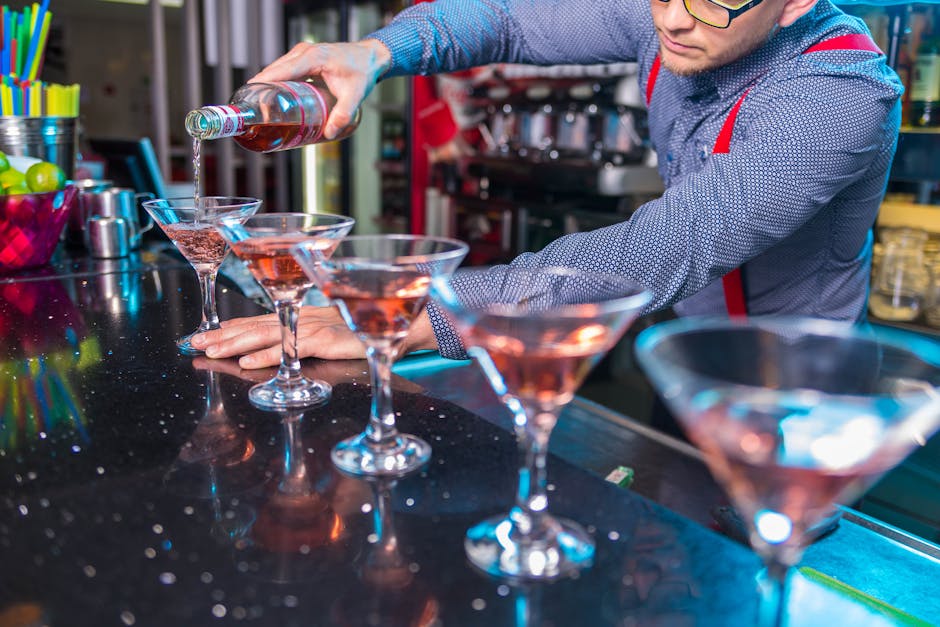
Why Distilled Spirits are Considered Gluten-Free
The distillation process is truly remarkable in its ability to purify alcohol. Think of it as nature's way of separating the good from the problematic. When that fermented liquid gets heated in the still, the alcohol becomes vapor and rises, but those heavy gluten proteins? They stay put at the bottom, unable to make the journey.
This isn't just theory – it's backed by solid science and regulatory approval. The Alcohol and Tobacco Tax and Trade Bureau (TTB) in the United States allows distilled spirits to carry "gluten-free" claims, even when they started from gluten-containing grains. The scientific research on the distillation process confirms this compatibility with gluten-free diets. The FDA agrees, stating that pure distilled spirits are considered gluten-free regardless of their original grain source.
This means you can confidently enjoy a wide range of spirits. Vodka made from wheat, corn, or potatoes all end up gluten-free after distillation. Gin, with its botanical blend, is safe. Rum from sugarcane is naturally gluten-free from start to finish. Tequila made from 100% agave never encounters gluten. Even whiskey, bourbon, and brandy – despite often starting from barley or other grains – emerge from distillation as gluten free alcoholic beverages.
At Two Flags, we take this a step further by starting with organic spelt, which is naturally gluten-free from fermentation through distillation. This gives our customers that extra peace of mind, knowing their vodka was crafted with gluten-free ingredients from day one.
Most people with celiac disease can safely enjoy pure distilled spirits. However, we always encourage listening to your body. Some highly sensitive individuals report occasional reactions, which experts believe may be due to cross-contamination or additives introduced after distillation rather than the spirit itself.
A Note on Flavored Spirits and Liqueurs
Here's where things get a bit trickier, and we need to put on our detective hats. While pure distilled spirits are safe, flavored spirits and liqueurs can be a different story entirely. Distillation removes gluten, but what happens afterward can bring it back.
Many flavored spirits get their unique taste from added ingredients that weren't part of the distillation process. These flavorings, colorings, and sweeteners might contain hidden gluten sources. Some caramel colorings, natural flavorings, or thickening agents could be derived from gluten-containing ingredients.
Cream-based liqueurs deserve special attention, as they often contain various stabilizers and flavorings. Pre-mixed cocktails in cans or bottles can be particularly tricky, since they might combine different types of alcohol or include malt-based ingredients alongside the distilled spirits.
The good news is that many liqueurs and flavored spirits are perfectly safe – you just need to do a quick ingredient check. When the label is clear and lists recognizable, gluten-free ingredients, you're usually good to go. When in doubt, especially at a bar with complex cocktails, it's always smart to ask your bartender about the ingredients or stick with simple mixed drinks using pure spirits and gluten-free mixers.
This careful approach ensures that your gluten free alcoholic beverages stay truly gluten-free, letting you enjoy your evening without worry.
Navigating the Complex World of Beer and Malt Beverages
Beer is perhaps the trickiest category when it comes to gluten free alcoholic beverages. If you're a beer lover who's recently gone gluten-free, I understand the disappointment. Traditional beer, with its rich history and beloved flavors, is almost universally made with malted barley or wheat - both packed with gluten. This means your regular lager, ale, or stout is unfortunately off the table.
But don't despair! The craft brewing world has acceptd the gluten-free movement, creating some genuinely delicious alternatives. The key is understanding what makes each option truly safe for your health.
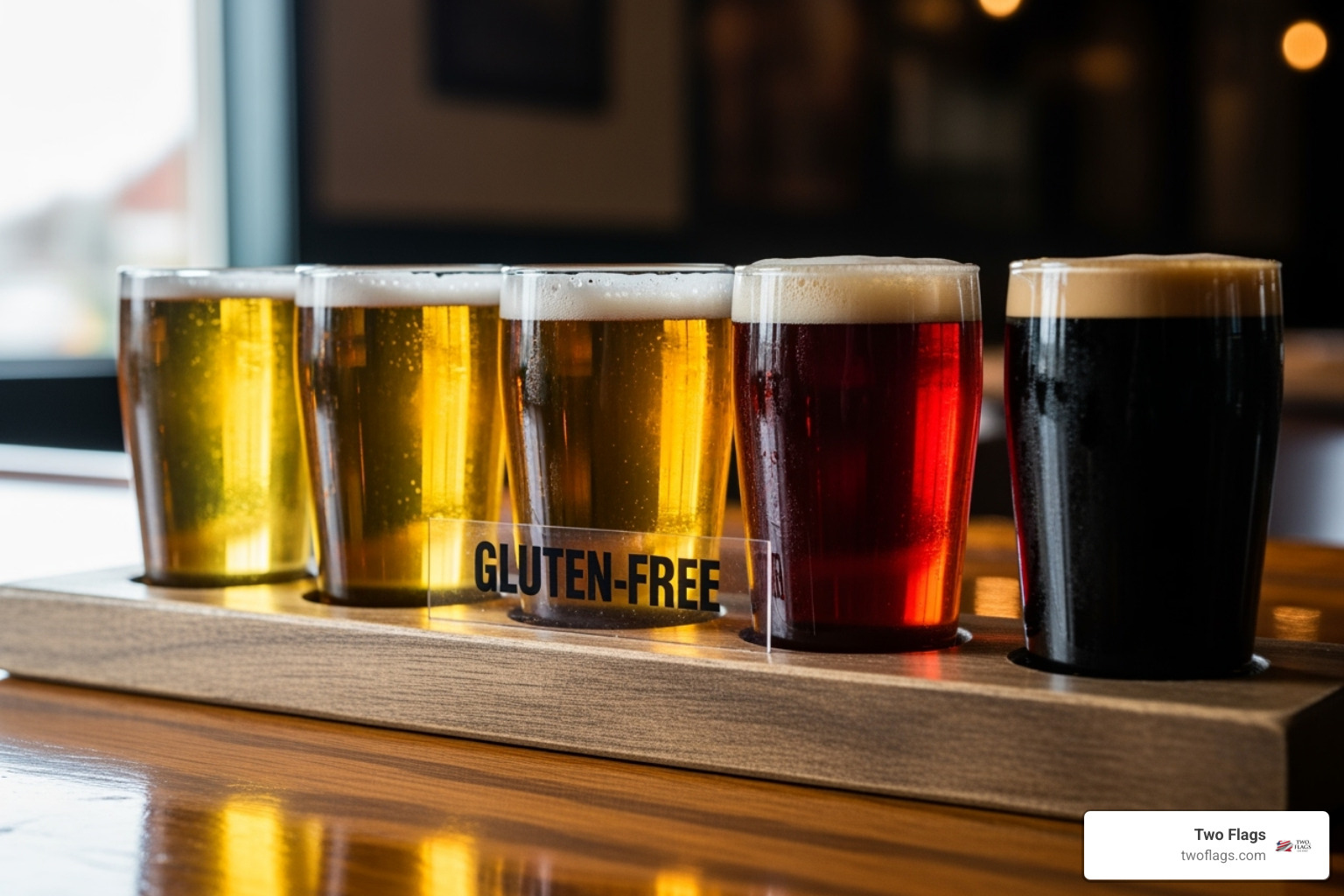
Certified Gluten-Free Beer
The gold standard for gluten free alcoholic beverages in the beer world is certified gluten-free beer. These brews are crafted from the ground up without a single gluten-containing grain in sight. Instead, creative brewers use naturally gluten-free alternatives that bring their own unique character to the glass.
Sorghum is probably the most popular choice, delivering a crisp, slightly sweet flavor that many find surprisingly satisfying. Rice offers a clean, light profile that works beautifully in lagers. Millet brings nutty, earthy notes that add complexity, while buckwheat - despite its misleading name - is completely gluten-free and contributes rich, robust flavors.
The brewing process for these beers happens in dedicated gluten-free facilities or on thoroughly cleaned equipment to prevent any cross-contamination. When you see that "certified gluten-free" label, it means the final product has been tested and contains less than 20 parts per million of gluten - the safety threshold established for those with celiac disease.
These beers have come a long way from the early days when gluten-free often meant flavor-free. Today's craft brewers are creating everything from hoppy IPAs to rich stouts using these alternative grains, proving that going gluten-free doesn't mean giving up great taste.
The "Gluten-Removed" Beer Controversy
Here's where things get murky, and frankly, a bit frustrating for consumers trying to make safe choices. Gluten-removed beers start their life just like regular beer - brewed with barley or wheat. But during the process, brewers add an enzyme that's supposed to break down the gluten proteins to supposedly safe levels.
The problem? Those gluten proteins aren't actually removed - they're just chopped up into smaller pieces. Think of it like tearing up a letter instead of burning it. The pieces are still there, and for people with celiac disease, those fragments can still trigger serious health problems.
Many celiac organizations strongly advise against these beers because the testing methods might not catch all the gluten fragments, and anecdotal reports suggest many people still react to them. The labeling can be confusing too - some places allow these beers to claim "gluten-free" status, while others require "gluten-reduced" labels.
My advice? If you have celiac disease or serious gluten sensitivity, stick with truly certified gluten-free beers made from naturally gluten-free grains. It's just not worth the risk to your health, no matter how good the marketing sounds.
Hard Seltzers and Coolers
Now here's some good news! Hard seltzers have become a refreshing salvation for many people seeking light, bubbly gluten free alcoholic beverages. Most hard seltzers are made by fermenting cane sugar and adding carbonated water with natural fruit flavors. Since cane sugar is naturally gluten-free, the resulting drink is safe and delicious.
These fizzy favorites offer a clean, crisp taste that's perfect for hot summer days or when you want something lighter than wine or spirits. They're typically low in calories too, which is a nice bonus.
But here's where you need to be careful: not all "coolers" or flavored malt beverages are created equal. Many of these colorful, fruity drinks are actually made with a malt liquor base, which means they contain barley and therefore gluten. They might taste like tropical paradise, but they're not safe for a gluten-free diet.
The key is reading labels carefully. If you see words like "malt," "barley," or "wheat" anywhere on the ingredients list, put it back on the shelf. Stick to products that clearly state they're made from cane sugar or carry a certified gluten-free label. When in doubt, ask - your health is worth that extra moment of verification.
Frequently Asked Questions about Gluten-Free Alcoholic Beverages
We understand that navigating gluten free alcoholic beverages can feel overwhelming, especially when you're trying to sort through conflicting information online. As someone who's spent years perfecting gluten-free spirits, I've heard these questions countless times from customers who just want to enjoy a drink without worry.
Is vodka or whiskey made from wheat gluten-free?
This is probably the question I'm asked most often, and I completely understand the confusion. The short answer is yes - pure distilled vodka or whiskey is gluten-free, even when made from wheat, barley, or rye. The distillation process works like magic here, effectively removing all gluten proteins because they simply can't vaporize with the alcohol.
Both the TTB and FDA back this up with their regulations, allowing distilled spirits to carry gluten-free claims regardless of their grain source. The science is solid - gluten proteins have such a high boiling point that they stay behind in the still while the pure alcohol vapor rises and gets collected.
That said, I always tell people to listen to their bodies. While the scientific consensus is clear, some individuals with extreme sensitivity occasionally report reactions to spirits made from gluten-containing grains. These reactions might be due to trace cross-contamination during bottling or sensitivity to other additives introduced after distillation.
For those seeking complete peace of mind, choosing spirits that start with naturally gluten-free ingredients can provide an extra layer of comfort. Our Two Flags Vodka, for instance, is crafted from organic spelt and rigorously tested for purity, offering assurance from grain to glass.
What is the real difference between 'gluten-free' and 'gluten-removed' beer?
This distinction is absolutely critical, especially if you have celiac disease. I've seen too many people get confused by clever marketing that makes these products seem interchangeable - they're definitely not.
Certified gluten-free beer is the real deal. These beers are brewed from start to finish using ingredients that never contained gluten in the first place. Think sorghum, rice, millet, corn, or buckwheat. These grains are naturally gluten-free, so the resulting beer is safe for anyone avoiding gluten. These beers are often third-party certified and rigorously tested.
Gluten-removed beer takes a completely different approach. These start with traditional barley (which contains gluten), then use enzymes during brewing to break down the gluten proteins into smaller pieces. While they might test below 20 ppm of gluten, the proteins aren't actually removed - they're just chopped up.
Here's the problem: those fragmented gluten proteins might still trigger reactions in people with celiac disease. Plus, our current testing methods might not catch all these broken-down fragments. That's why most celiac organizations strongly recommend sticking with certified gluten-free beer made from naturally gluten-free grains.
Are cocktails safe to drink on a gluten-free diet?
Cocktails can absolutely be part of your gluten free alcoholic beverages repertoire, but they do require a bit of smart navigation. The beauty is that many classic cocktails are naturally gluten-free when made properly.
Simple cocktails built with pure distilled spirits and basic mixers are usually your safest bet. A gin and tonic with fresh lime, a vodka soda with a splash of cranberry, or a classic margarita made with 100% agave tequila are all great choices. These drinks rely on ingredients we know are safe.
The tricky part comes with more complex cocktails that might include flavored spirits, pre-made syrups, or specialty liqueurs. These can harbor hidden gluten in their flavorings, thickeners, or colorings. Some bitters might contain gluten too, though the tiny amounts used rarely cause issues.
My advice? Keep it simple when in doubt, and don't hesitate to ask questions. A good bartender should know their ingredients, and most are happy to help when you explain you're avoiding gluten. If you're at a busy bar where communication is difficult, stick to straightforward drinks made with spirits you trust and fresh mixers like fruit juices or plain soda water.
Cross-contamination can occasionally happen in busy bars if equipment isn't properly cleaned between drinks, but this is less common. The key is being proactive about your choices while still enjoying the social experience of cocktails.
Conclusion
Finding safe gluten free alcoholic beverages might seem overwhelming at first, but as we've finded together, you actually have more delicious options than you might think! The world of gluten-free drinking is rich with possibilities, from crisp wines to smooth spirits to refreshing seltzers.
Distillation truly is magical when it comes to spirits. Even if a vodka, gin, rum, tequila, or whiskey started life from gluten-containing grains, the distillation process removes those troublesome proteins completely. This scientific fact opens up a whole world of cocktails and neat pours for your enjoyment. At Two Flags, we take this one step further by crafting our vodka from organic spelt, ensuring it's naturally gluten-free from grain to glass and rigorously tested for the ultimate peace of mind.
Nature provides plenty of naturally safe choices too. Wine made from grapes, hard cider from apples, and most hard seltzers from cane sugar are all naturally free of gluten. These options prove that going gluten-free doesn't mean giving up variety or flavor.
Beer requires a bit more attention, but don't despair! Certified gluten-free beers made from sorghum, rice, or millet offer genuine alternatives to traditional brews. Just remember to steer clear of "gluten-removed" beers if you have celiac disease – they're simply not worth the risk.
Label reading becomes your superpower when dealing with flavored spirits, liqueurs, and pre-mixed cocktails. A quick glance at ingredients can save you from hidden gluten that might sneak in after distillation. When you're out at a bar or restaurant, don't hesitate to ask your bartender about ingredients – most are happy to help ensure your drink is safe.
Your gluten-free journey doesn't have to limit your social life or celebration moments. Armed with this knowledge, you can confidently order that cocktail, pop open that bottle of wine, or try a new gluten-free beer. We're excited to be part of your gluten-free trip as the Two Flags, One Spirit: Taste of Polonia 2025 Official Sponsor, bringing our commitment to quality and tradition to even more people who deserve exceptional, safe spirits.
Here's to making informed choices, staying healthy, and never missing out on life's good moments. Cheers to finding your perfect gluten free alcoholic beverages!


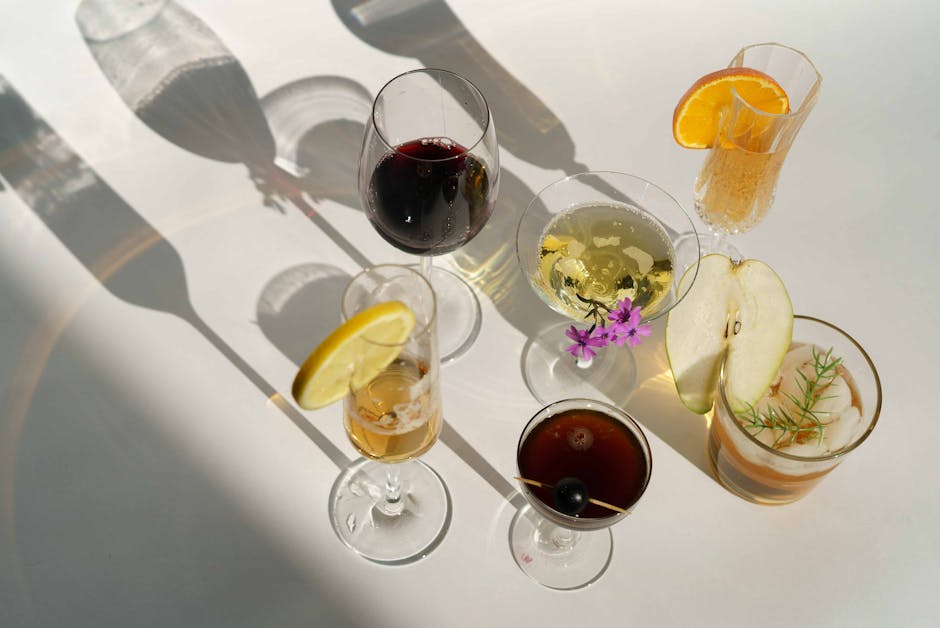
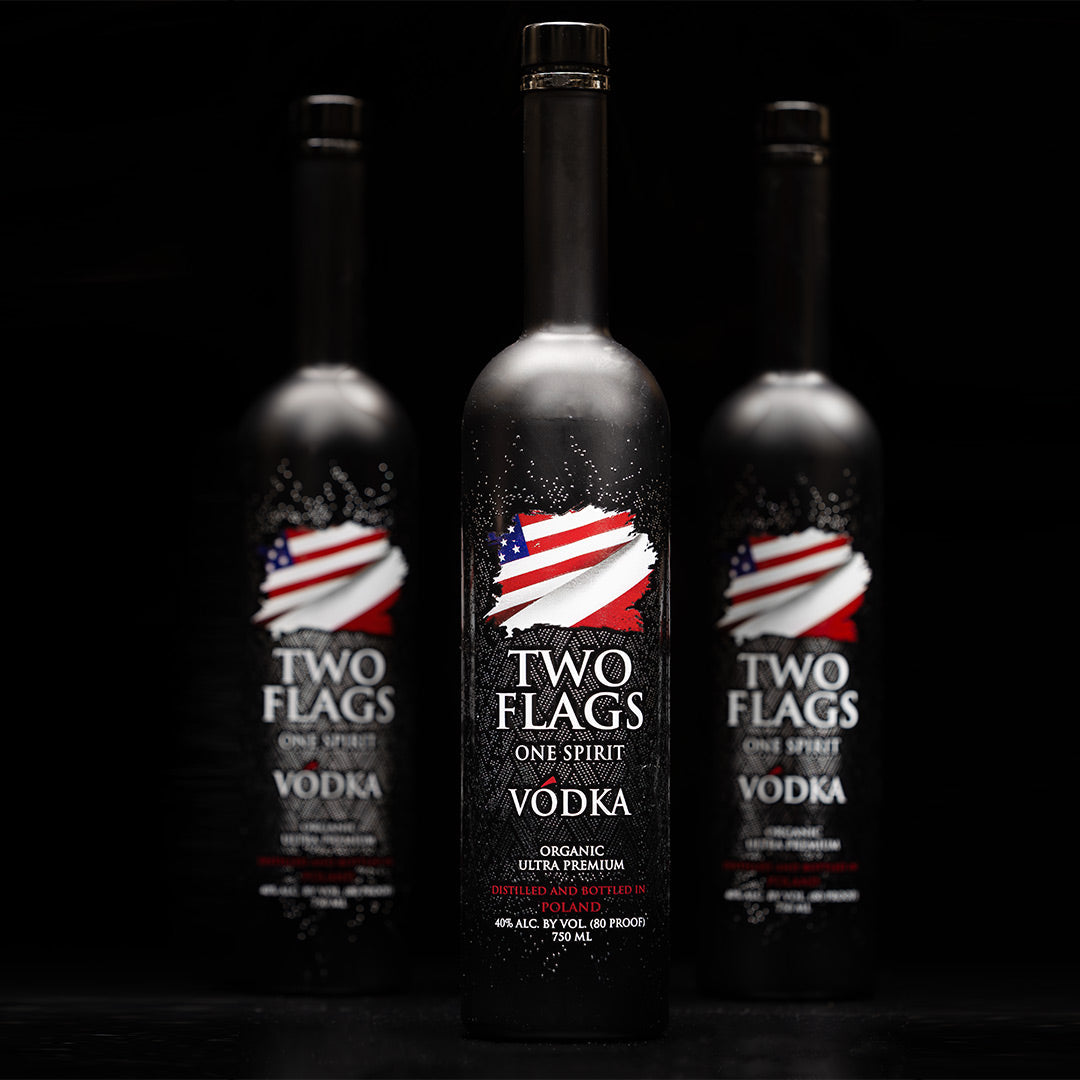
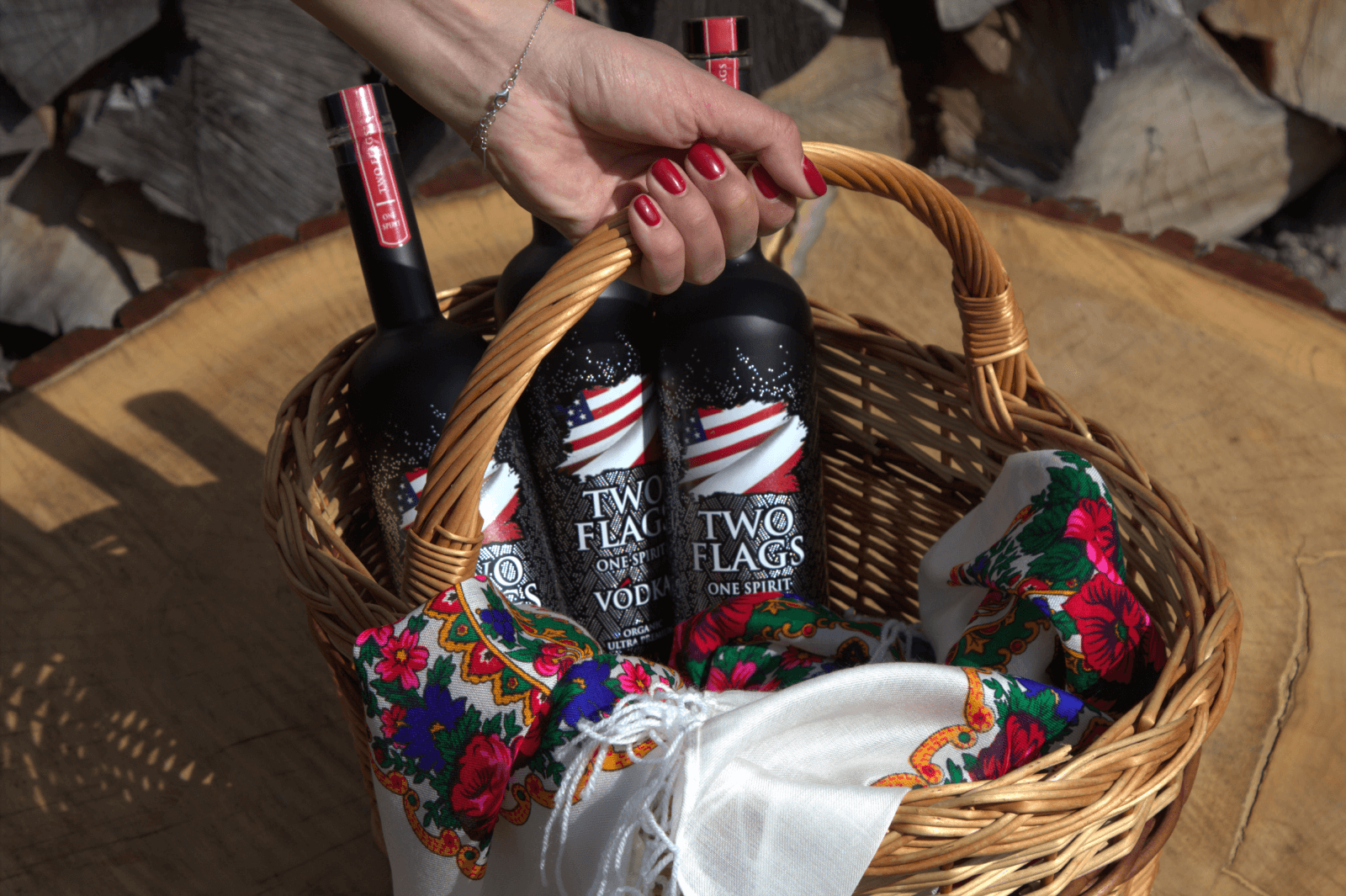
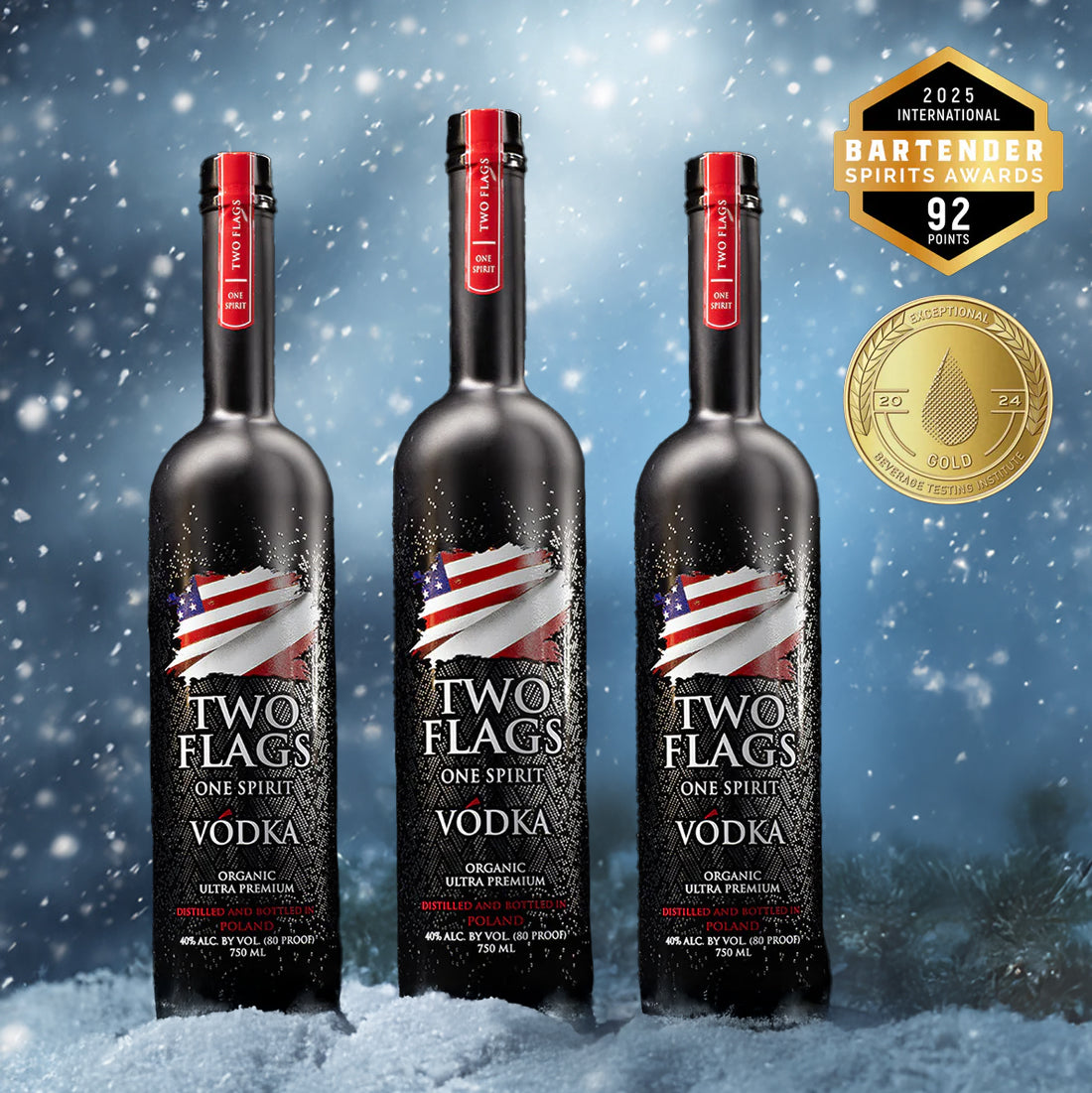
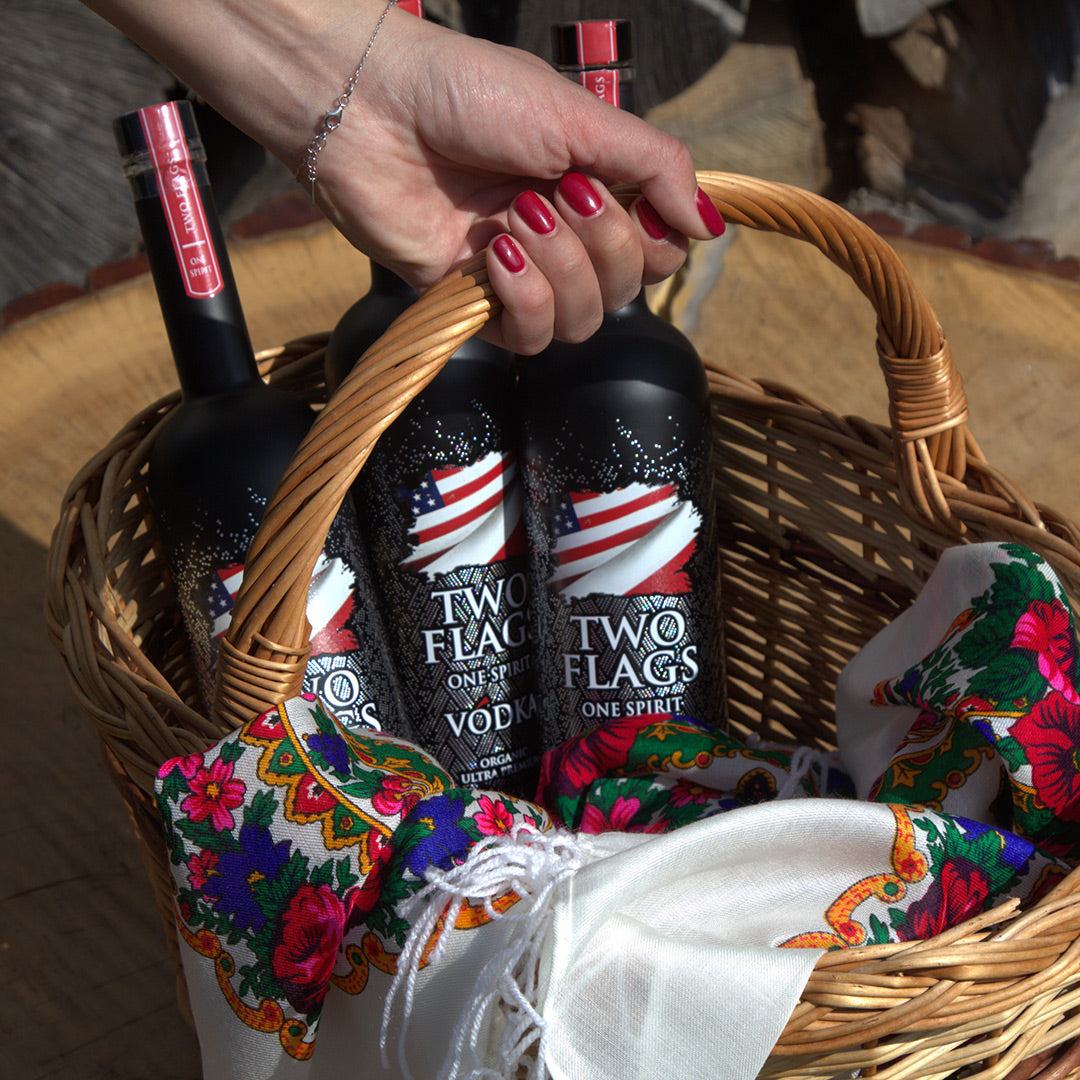
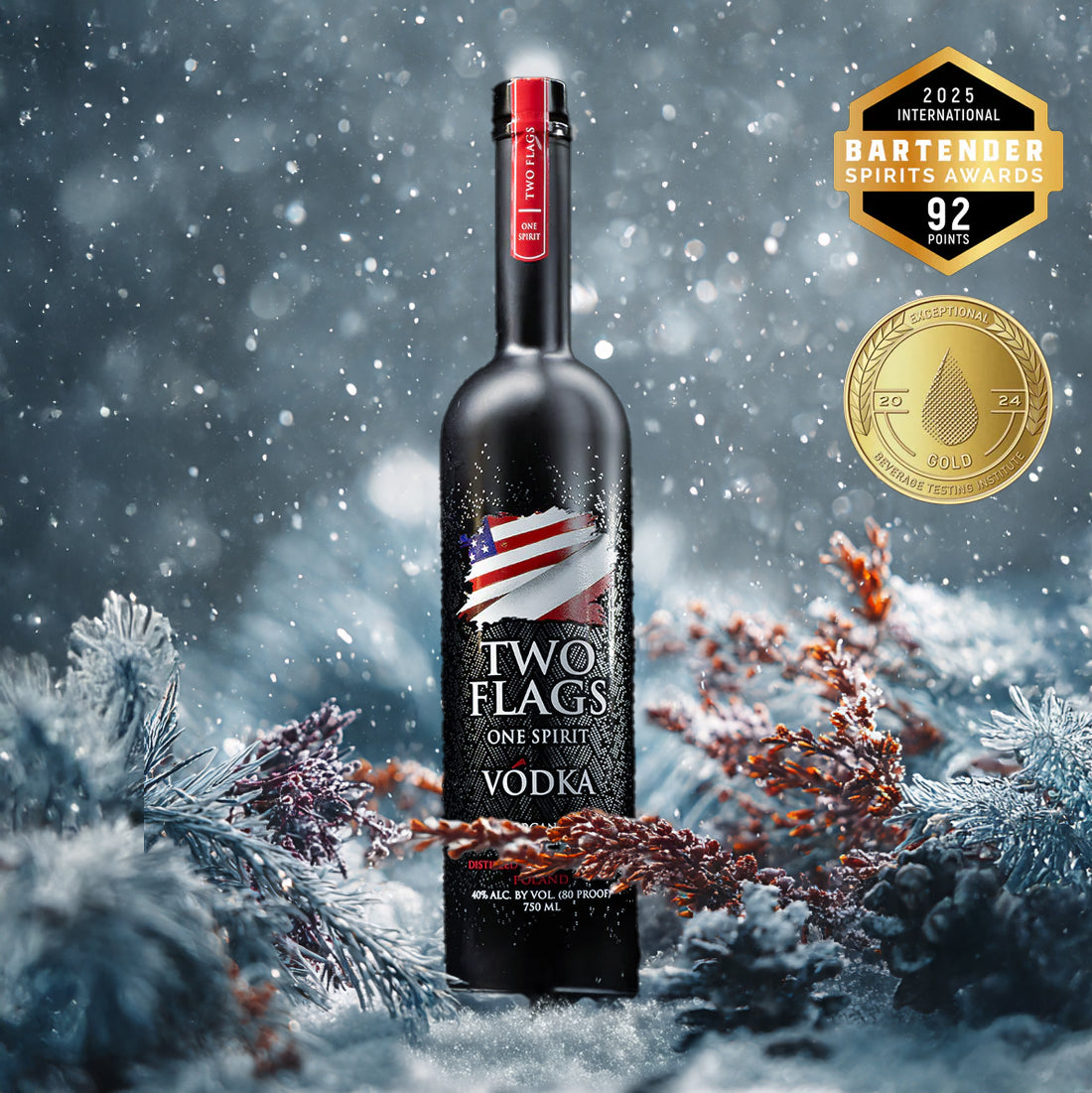
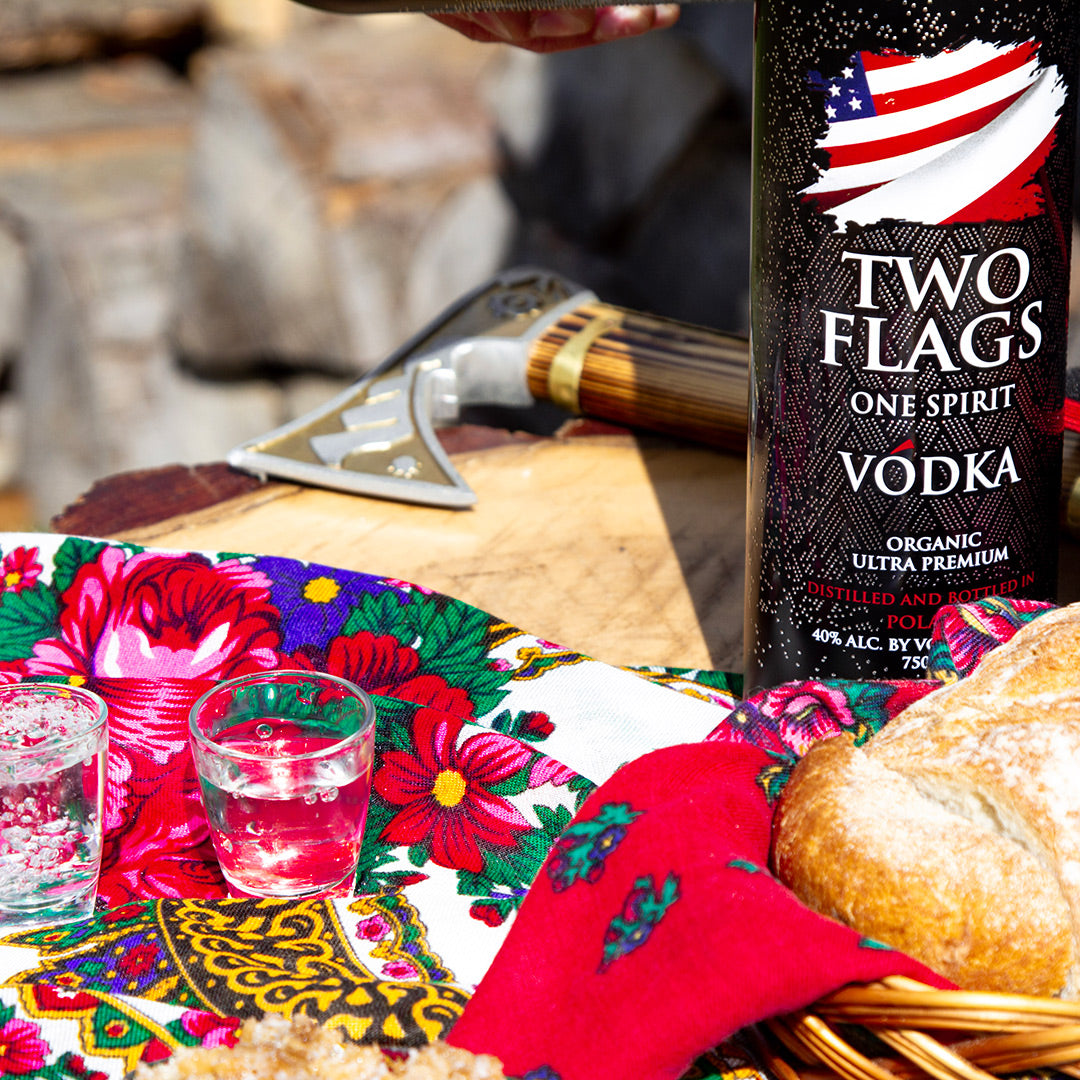
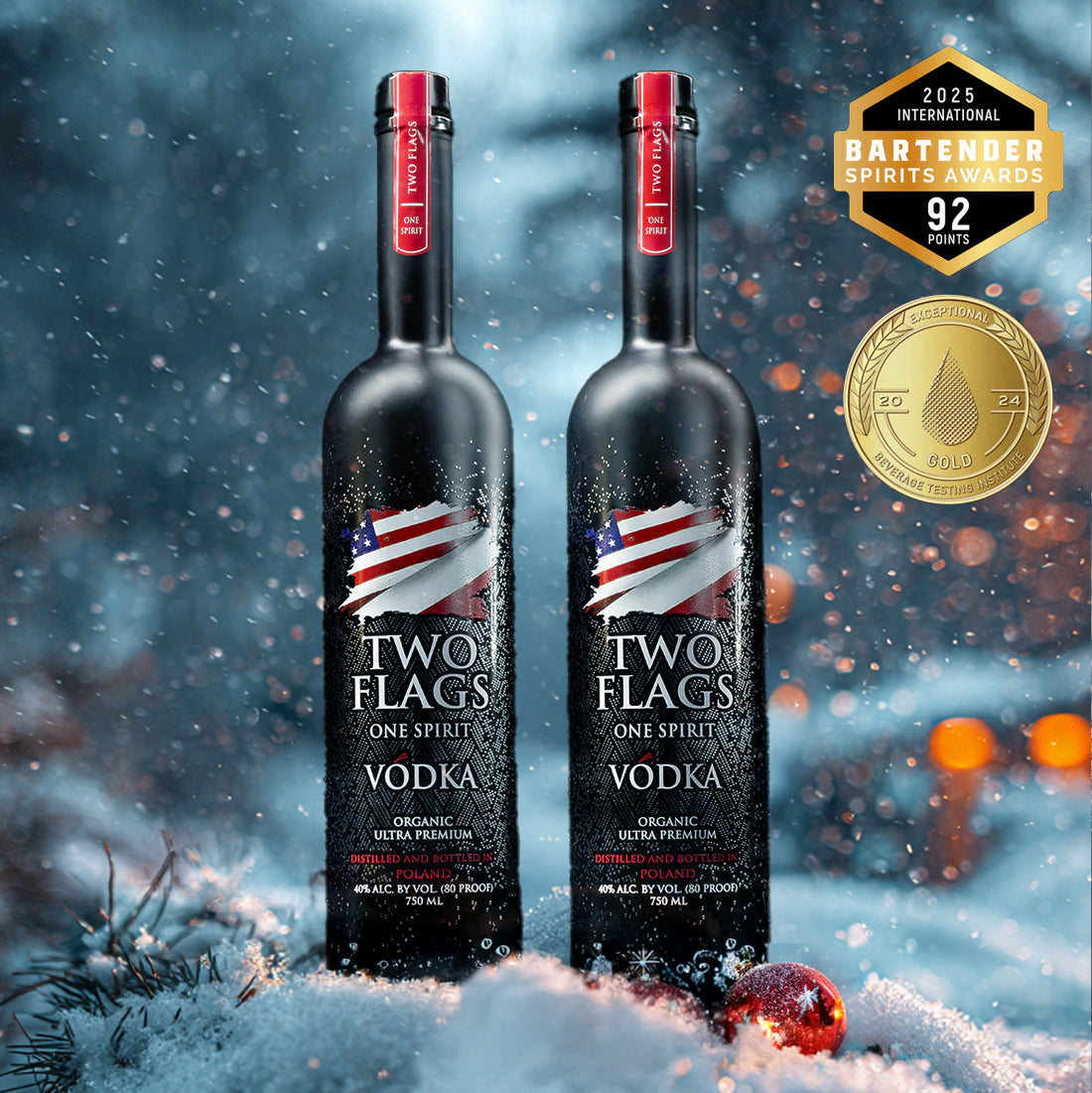
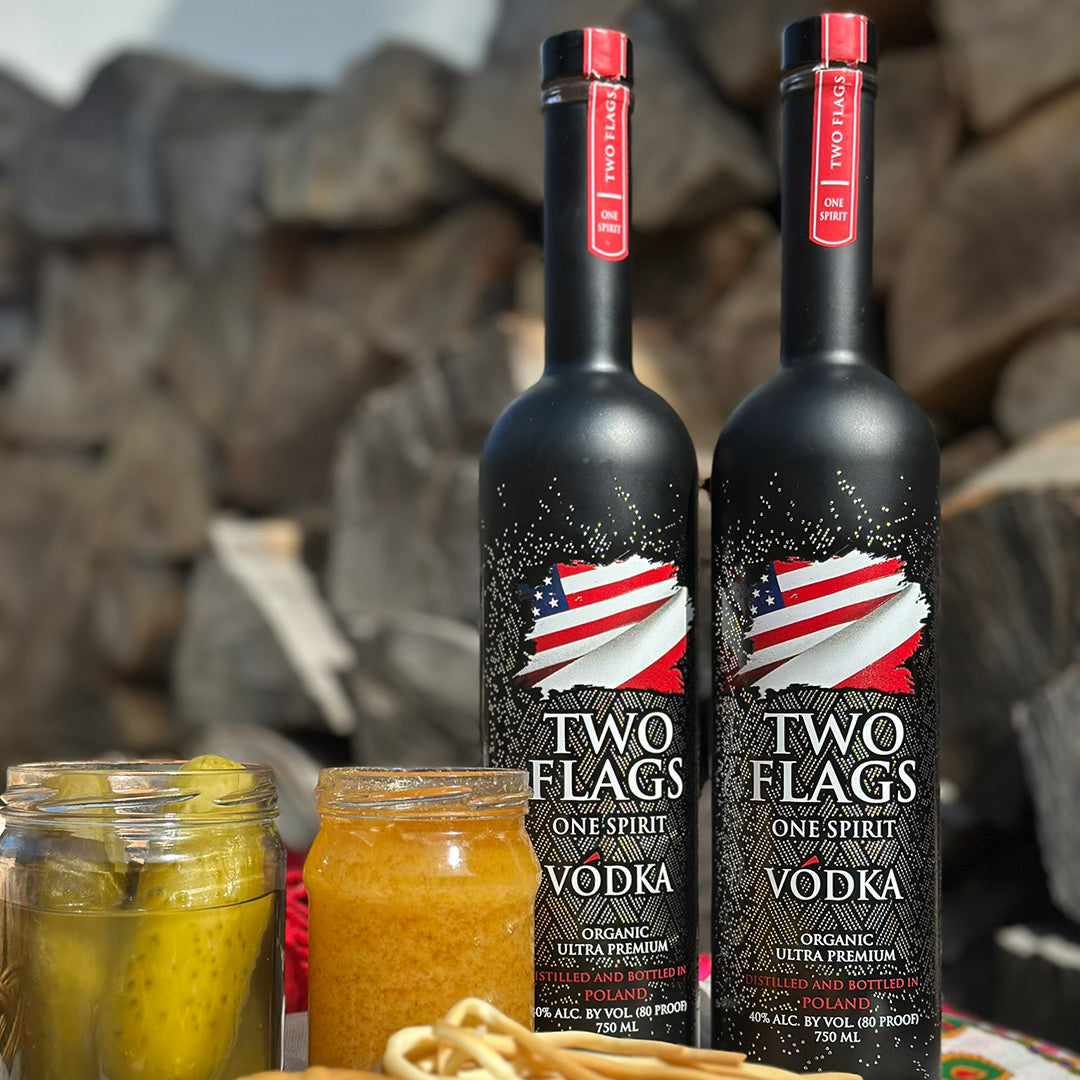
Leave a comment
This site is protected by hCaptcha and the hCaptcha Privacy Policy and Terms of Service apply.